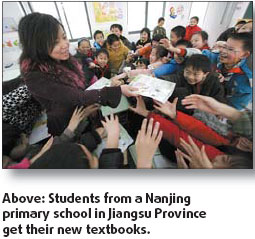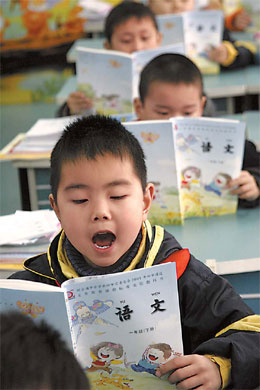Not on the same page
Hong Kong novelist Louis Cha (also known as Jin Yong, or Cha Leung Yung) is extremely popular among Chinese readers of different age groups.

Arguably the number one wuxia (kungfu fiction) writer in China, Cha has created in his dozens of novels an imaginary and enthralling world of swordsmen and kungfu masters, sandwiched with heart-wrenching love stories. Many of them have been adopted into popular TV drama series and even online games.
And the characters, fancy terms and concepts about Chinese kungfu have become part of daily language in China.
But the news that his novel Fox Volant of the Snowy Mountain (Xueshan Feihu) has been included in the newly circulated textbook on Chinese language and literature for senior high school students, in place of Lu Xun's Story of Ah Q, has caused a big stir.
Are his works good enough to be included in the Chinese language and literature textbook, which has for decades been treated as a holy shrine only for centuries old classics?
People are divided.
"I sense a change of ideas in teaching Chinese language and literature for senior high students," says Li Shaoqiang, a teacher from Nanjing of East China's Jiangsu Province.
Cha's works appeal to millions of Chinese readers, including high school students, Li tells local media.
The popularity and readability of Cha's works may easily fuel students' enthusiasm for learning Chinese language and literature, Li explains.
According to Li, the traditional Chinese language and literature textbooks put too much emphasis on the significance of the meaning and sub-context in the literary works, such as satirical essays by Lu Xun, one of the country's most important writers and thinkers active in the 1930s.
Usually teachers require students to memorize new words in the text and summarize an article's theme instead of encouraging students to probe the texts' deeper meaning. The classes, which could have been interesting and enjoyable, turn out to be boring and even painful for both teachers and students, Li says.
However, others disagree.
"In my memory, Lu Xun's works are the best in my high school textbook. Cha is not an equal to Lu Xun," writes Han Han, a Shanghai-based young writer in a recent essay.
"As a high school student, I enjoy reading Cha's works very much," says Bao Yuhan, a student with the High School Attached to the Peking University. "But I do not think it is appropriate to include his works in our textbook.
"The tit-for-tat revenge between kungfu masters is not a good idea for today's youths living in a law-binding society."
As well as Cha's novel in the revised textbook, literary works by younger authors, such as Yu Hua (novel: Xu Sanguan Sells Blood) and Hai Zi (poem: Facing the Sea, Flowers Blossoming in Spring) are included.
Meanwhile, some of Lu Xun's works, such as A Small Incident, Good Wishes, and Medicine, and a string of essays and poems by ancient authors have been omitted.
Critics have called this revision "an attempt to make the textbook into a land of entertainment" while others hailed it as "a great step to blow fresh air into old-fashioned, stifling, boring texts".
Besides the revised textbook on Chinese language and literature, the revised history textbooks are also targets of attack.
|
Students in a Chinese language class. Photos by Liu Li |
The revised history textbook is arranged in an assortment of topics such as Reforms in Human History, Development of Democracy in Modern Times, Economic Developments, and World Cultural Heritages.
Previously, the mandatory history textbooks were arranged in chronological order and included the wars. Under the current curriculum, chapters about World War I and II have been taken out of the mandatory course and included into the elective course: Peace and Wars in the 20th Century.
But the move has angered critics, who say all Chinese young people must learn about these two important events.
"The content about world wars should be viewed as a vital component of history," wrote one critic on sina.com.
Another critic writes: "The world wars have exerted huge influence on today's world. Without knowing the cause and effect of the world wars, how can the students understand the world today?"
But Beijing educators insist the new curriculum is designed to make it easy for students to digest the complicated history facts. Some history teachers agree.
"The revised history textbook is better to understand compared with the previous edition, which carries too many details," says Li Hongjian, a history teacher with Beijing No 2 High School.
"The new book prompts students to think and to draw conclusions by themselves instead of learning and memorizing the views made by historians."
Pressured by public opinion, many high schools have announced that the elective course Peace and Wars of the 20th Century would be a mandatory course for students planning to major in literal arts and humanities at university, which is roughly the same with the present situation.
The issue of elective courses for senior high students is also a focus of public attention.
Beijing high school students have a wealth of elective courses to choose from, starting from this autumn. It is reported that hundreds of elective courses have been introduced to 65,000 students newly enrolled in senior high classes in Beijing.
Elective courses vary widely in topics. Among the most eye-catching ones are Basics about Finance and Economics, Clean Air, Global Warming, Remote Sensing, Astronomy, Computer Programming, Oil Art, Understanding English Movies, Modern United Nations, and World Military Affairs.
"Previously, the elective courses were sporadically adopted by the most competitive high schools," Hao Xianjun, principal of Beijing No 9 High School, tells local media.
"Now, the curricular reform in senior high schools in Beijing is in full swing."
The elective courses consist of both State-mandated courses and those prepared by the high schools. To get a diploma after three years' study, a senior high school student must gain at least 28 elective credits, including 22 credits from State-mandated elective courses, according to Hao.
"Students who are used to studying almost everything arranged by their teachers will have to make their decisions and learn to plan for their future.
"The introduction of elective courses would help breed the idea of democracy and choices based on independent thinking," he concludes.
Teachers say the increased amount of elective courses would also pressure them to change their ideas and way of teaching.
"I used to view it as a waste of time for my students to watch movies," says Shao Zi, a teacher of English with the No 2 High School Attached to Beijing Normal University. "Now I have come to see it a new channel for them to know about the real world."
And teachers have to spend more time to better prepare themselves for students who are advised to read English novels and have discussions and debates under the guidance of teachers, Shao says.
Grade one high schooler Bao Yiqiao with the No 2 High School Attached to Qinghua University has chosen Personal Investment and Finance for the first year in senior high school.
"Dealing with money matters is a crucial skill," she says. "It is very useful for a smart living."
Liu Bingjian, a beginner with the senior level of the High School Attached to Peking University, prefers Model United Nations and Latest Developments in Life Science.
"I hope to become a great scientist. But to achieve that, it is necessary to know more about world trends both in the society and in science," he explains, adding that some of the elective courses may give him a chance to have close encounters with top Chinese scientists, as some of them will be invited to teach at their high school.
Nonetheless, some parents of the students are not supportive of their children's personal choice of elective courses.
"For the sake of the competitive gaokao (national college entrance exam), I would not encourage my child to take elective course of little importance," a lady surnamed Zhao tells the Beijing News.
"My son's decision to take Car Driving was vetoed at the dinner table. We encourage him to take higher mathematics. We consider it a waste of time at this stage of life to learn how to drive," explains Zhao.
Research points out that it is vital for the students to take elective courses at their own will.
"Having received nine years of one-size-fits-all compulsory education, the young Chinese should have more space to develop their individuality and tap their potentials in different fields," Li Yanlin, an education researcher with Capital Normal University, tells local media.
(China Daily 09/18/2007 page18)















